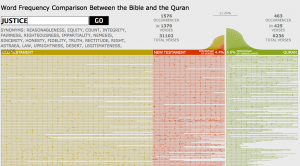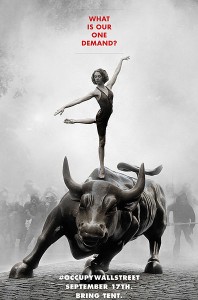Story
This morning, as I caught up on what had been going on in the world over the weekend, I stumbled across a very interesting resource -- a website that compares the frequency with which words appear in the Bible and the Quran.
Although that in itself is an interesting tool, I was less interested in the comparison feature and more interested to see how often certain words appear in the Bible.
From the official statement by #OccupyWallStreet: "As one people, united, we acknowledge the reality: that the future of the human race requires the cooperation of its members; that our system must protect our rights, and upon corruption of that system, it is up to the individuals to protect their own rights, and those of their neighbors; that a democratic government derives its just power from the people, but corporations do not seek consent to extract wealth from the people and the Earth; and that no true democracy is attainable when the process is determined by economic power."
 "Jesus' spirituality was magnetic. Wherever he went, people gathered. His love, understanding and compassion toward humanity was overflowing and people traveled from afar to find solace in his teachings and to breathe life into their spiritual lives. His message of inclusiveness was seen as a threat by the religious leaders of his time -- whose very existence relied on a system of exclusivity."
"Jesus' spirituality was magnetic. Wherever he went, people gathered. His love, understanding and compassion toward humanity was overflowing and people traveled from afar to find solace in his teachings and to breathe life into their spiritual lives. His message of inclusiveness was seen as a threat by the religious leaders of his time -- whose very existence relied on a system of exclusivity."
"I'm finding out as I'm aging that I am in love with the world. And I look right now, as we speak together, out my window in my studio and I see my trees and my beautiful, beautiful maples that are hundreds of years old, they're beautiful. And you see I can see how beautiful they are. I can take time to see how beautiful they are."
We had a very hot ride in the police van, but the Park Police processed us very quickly. We were released from custody and greeted outside with water, granola bars, and hugs. What could be better?
But the point was not to get arrested. The point was to make of our lives a living witness. To make it clear that climate change has gone too far and we are no longer going to stand idly by while our sisters, brothers, and home planet are torn apart by oil companies. Here are a handful of photos from the event yesterday:
I remember vividly the first time I went to a comic book shop with my mom. I'd sneaked there before. But this time was different. This time I'd come without pretense, openly confessing my love of the four-color art form. I was in the fifth grade.
While I perused the back issue bins in the middle of the shop, my mother looked from one rack to the next, her face slowly solidifying into a grimace. On one cover, a half-naked green man punched a half-naked rock man in the head. On another, a woman wearing spandex tight enough to be body paint draped herself over some sort of futuristic motorcycle. Eventually, my mother's eyes fell upon the cover of a sword-and-sorcery title near the cash register. Behind a tan, sinewy barbarian stood a harem of women, all wearing thin strips of well-placed linen. We left before I could make a purchase.
The Lord called Samuel again, a third time. And he got up and went to Eli, and said, 'Here I am, for you called me.' Then Eli perceived that the Lord was calling the boy. 9Therefore Eli said to Samuel, 'Go, lie down; and if he calls you, you shall say, "Speak, Lord, for your servant is listening." (1 Samuel 3.8-9)
I am in a profession where the term "call" is used frequently. When used as a verb, "call" is about feeling that tug between you and God toward something that at first may not seem practical, desirable, or even expected. When used as a noun, "call" can be synonymous to a job, occupation, ministry, or church -- hence the term "seeking a call."
For me, "seeking a call" simply means trying to figure out what to do next. And lately this task has felt like an impossible mission. I have always admired -- or if I'm to be honest, jealous of -- those that seem to have a clear sense of their calling. Take my husband for example, he feels very called to be a pastor. Although there are times when he struggles with the type of church or ministry he feels called to serve, he has certainty that his call is that of a pastor. I wish that was the case for me. I have always felt called to a place, such as seminary or my current congregation, but I have never felt confirmation or an affinity to my call as a pastor. This may not make sense or may seem odd, but welcome to my life.
I have always loved the story of Samuel being called.
It's Jesus walking on the water Sunday here at House for All Sinners and Saints, and we thought maybe during "Open Space" we should have a kiddie pool set up in the back so you could all "test your faith." You know -- go ahead and give it the old Christian try. That's how I've always heard this story preached: like it's the "Little Engine Who Could Have." As a matter of fact, here's a one-minute version of the sermon I just don't have the stomach to preach to you
 If you are a 12-year-old baseball player, it looks like a field of dreams. There are huge bleachers wrapped around home plate, and extending into left and right field. Behind home, there is a high official box where the game is announced, scores are kept, and reporters watch and write their stories. The field itself looks carefully tended with freshly cut green grass, and a flat-raked dirt infield without potholes, bumps, or ditches. And the beautiful grass of the outfield extends to actual fences, which each player hopes to reach as they gaze at the most perfect baseball diamond any of them have ever played on.
If you are a 12-year-old baseball player, it looks like a field of dreams. There are huge bleachers wrapped around home plate, and extending into left and right field. Behind home, there is a high official box where the game is announced, scores are kept, and reporters watch and write their stories. The field itself looks carefully tended with freshly cut green grass, and a flat-raked dirt infield without potholes, bumps, or ditches. And the beautiful grass of the outfield extends to actual fences, which each player hopes to reach as they gaze at the most perfect baseball diamond any of them have ever played on.
John Stott died this Wednesday. He was 90 years old. What many people don't understand is that he was the most influential 20th-century evangelical leader in the world, with the exception of Billy Graham. Stott became the Anglican rector of All Souls Church in downtown London at the age of 29 in 1950, and he stayed there for his entire ministry. But from his parish at Langham Place in the city's West End, and right across from BBC headquarters, John Stott spoke to the world with 50 books that sold 8 million copies. He also traveled the globe , speaking, teaching, convening, mentoring, and bird watching -- a personal passion.
Perhaps the most telling thing about this man is all the personal stories about "Uncle John" that the world is now hearing, from many Christian leaders around the world who were profoundly influenced, encouraged, and supported by John Stott. And secondly, how such a giant in the Christian world remained so humble, as testified to by those who knew him who say how "Christ-like" he was.
When John Steinbeck's classic novel The Grapes of Wrath was published in 1939, it caused a sensation. It won the Pulitzer Prize and was the best-selling novel of the year. Just months later, in 1940, the book was turned into a film by John Ford, which was nominated for seven Academy Awards.
For readers today, Steinbeck's migration saga remains relevant as a piece of (dramatized) social analysis. It's essentially a road novel about the Joads, a poor Midwestern migrant farming family. Throughout the novel, the Joads fight to keep their family intact while fleeing the 1930s Oklahoma Dustbowl for the hope of farm work in California.
"And all ate and were filled; and they took up what was left over of the broken pieces, twelve baskets full. And those who ate were about five thousand men, besides women and children." --Matthew 14:13-21
Immediately before the story of the feeding of the 5,000 is a description of a very different sort of meal: John the Baptizer's head on a platter. And just as women and children are included among the multitude fed on the beach (a detail unique to Matthew's version of the story), the female sex is also represented in the account of John's demise: Herodias, sister-in-law of Herod, asks for the head of the Baptist; her nameless daughter, with no detectable squeamishness, delivers the request to the king and serves up the plated head to her mother. (That women in all of their moral complexity are present throughout Matthew's gospel - recall also the women who appear in the genealogy of Jesus in chapter one -- is an observation worthy of closer scrutiny. See, for instance, Jane Kopas's 1990 essay in Theology Today).
Walmart has launched a charm offensive as part of its new urban strategy to impose smaller versions of its big box in inner cities across the country. It has proposed four stores for Washington, D.C. -- all in predominantly minority, and most in low-income, neighborhoods.
The debate over building Walmart stores in D.C. is engaging intense public sentiment, and for good reason. While Walmart promises new jobs in a community, in reality it displaces other local businesses, leaving in question whether there is a net jobs gain; one study showed that for every retail job Walmart brought, communities lost 1.4 other jobs. In addition, Walmart passes on the cost of its low wages to taxpayers when associates and their families rely on publicly funded health care and other assistance programs.
!['Civil Rights March on Washington, D.C. [Dr. Martin Luther King, Jr., President of the Southern Christian Leadership Conference, and Mathew Ahmann, Executive Director of the National Catholic Conference for Interrracial Justice, in a crowd.], 08/28/1963' photo (c) 1963, The U.S. National Archives - license: http://www.flickr.com/commons/usage/](http://lh3.ggpht.com/-XUAmAA_vWKI/Ti7l4ZavSOI/AAAAAAAACS8/0Y0EfQ03QzA/Flickr-4101511358.jpg) How should music rank among the ever-growing list of time-tested nonviolent methods such as boycotts, marches, strikes, sit-ins, and vigils?
How should music rank among the ever-growing list of time-tested nonviolent methods such as boycotts, marches, strikes, sit-ins, and vigils?
Anthony Shadid of the New York Times reports that a song, "Come on Bashar, Leave," is spreading across Syria, boldly calling on President Bashar al-Assad to step down. (Bryan Farrell also wrote about it at the Waging Nonviolence blog.) The article suggests that a young cement layer who chanted it in demonstrations was pulled from the Orontes River this month, his throat having been cut, and, according to residents of the city of Hama, his vocal chords torn out. Hama is where, in 1982, then-president Hafez al-Assad, father of the current president named in the song, gave orders to the army to massacre more than 10,000 in putting down an Islamist upheaval. Today, boys 6-years-old and older vocalize their own rendition of the original warbler's song instead. As the song has sped across Syria, demonstrators have adopted it for themselves.
I'm getting arrested on Aug. 29 at the White House. It's time to put my body where my soul is -- defending God's creation.
A interreligious contingent has chosen Aug. 29 as our arrest day. Jews, Muslims, Christians, and others will train together on Aug. 28 and then worship and risk arrest together on Aug. 29.
This is part of a two-week campaign (Aug. 20-Sept. 3) in which leading environmentalists including Wendell Berry, Naomi Klein, and Bill McKibben will join a peaceful campaign of civil disobedience to block the approval of a dirty oil pipeline that will cross the United States. As one Canadian wrote, "This [pipeline] will make the Great Wall of China look like Tom Sawyer's picket fence." Bill McKibben explained further in an earlier blog on God's Politics:
As the time shortens for Congress and President Obama to agree to the contours of legislation to raise the nation's debt ceiling, I am reminded of the story of King Solomon and his judgment regarding two women who both claimed to be the mother of a child (I Kings 3: 16-28). Solomon ordered that the living child be cut in two and half a dead child be given to both women. The woman who was the true mother insisted that the living child be given to the false mother. She was willing to give up her righteous claim to save the child's life.
Shakespeare said a rose by any other name would smell as sweet. Maybe, but a Stink Rose by any other name (say... garlic?) might get more play.
On July 19, Campus Crusade for Christ announced its plan to officially change its name to Cru in early 2012.
Brown v. Board of Education had not yet been fought in the Supreme Court when Bill and Vonetta Bright christened their evangelical campus-based ministry Campus Crusade for Christ in 1951. The evangelical church context was overwhelmingly white, middle class, and suburban. The nation and the church had not yet been pressed to look its racist past and present in the face. The world had not yet been rocked by the international fall of colonialism, the rise of the Civil Rights movement, the disillusionment of the Vietnam War, the burnt bras of the women's liberation movement, the fall of the Berlin Wall, or the rise of the Black middle class (more African Americans now live in the suburbs than in inner cities). In short, theirs was not the world we live in today. So, the name Campus Crusade for Christ smelled sweet. Over the past 20 years, though, it has become a Stink Rose ... warding off many who might otherwise have come near.
"I will call them my people, who were not my people. And her beloved, who was not beloved." (Romans 9:25 referencing Hosea 2:23)
Estranged, alienated, and removed; anyone living in an industrialized modern society in the 21st century would be able to define, or at least identify the sentiments of these words. Our time is one of mass communication and instantaneous access to knowledge. And yet our lives are too compartmentalized, increasingly divided, and our society reflects this. Indeed the existential writers of yesteryear were correct in diagnosing the iron cage that would befall us, ultimately leading to an eclipse of reason.
After months of good-faith reforms and patience, the drama is back in Egypt's Tahrir Square as protesters are preparing for a potential showdown with the state's military rule. The movement, among other things, is demanding an end to military rule -- a more radical call that reflects both the frustration with the status quo and the hope for a better way.
Two weeks ago, at the "Day of Persistence," Egypt saw its largest resurgence of public protest since former President Hosni Mubarak was ousted in February. The nation-wide protests show Egyptians camping out in Cairo's Tahrir Square, staging sit-ins and blocking traffic in Alexandria, and threatening to shut down Suez's tunnel access to Sinai. So why are the people confronting -- albeit nonviolently -- an interim government that has promised elections and a new constitution? A glance at the collective demands drafted in Tahrir Square make clear that the movement's demands -- both political and economic -- have not progressed much under the military rule of the Supreme Council of the Armed Forces.

